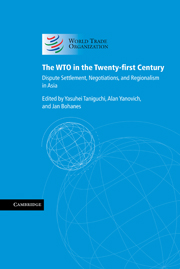Book contents
- Frontmatter
- Contents
- Notes on contributors
- Acknowledgements
- Table of dispute settlement cases and reports
- List of abbreviations
- Introduction
- PART I The WTO at Ten
- PART II Accomplishments and Future Prospects of the WTO Dispute Settlement System
- PART III Asian Perspectives on WTO Dispute Settlement
- PART IV The Doha Development Agenda and Beyond
- 16 The central place of market access for the WTO's development round
- 17 Agricultural issues in the Doha Development Agenda negotiations
- 18 Beyond Doha: reflections on the future of trade remedies
- 19 Reflections on the relationship between WTO negotiations and dispute settlement: lessons from the GATS
- 20 Trade in services and sustainable development in the context of the WTO: the case of higher education
- 21 The WTO and sustainable development
- PART V Asian Regional Integration and the Multilateral Trading System
- Index
17 - Agricultural issues in the Doha Development Agenda negotiations
from PART IV - The Doha Development Agenda and Beyond
Published online by Cambridge University Press: 05 March 2012
- Frontmatter
- Contents
- Notes on contributors
- Acknowledgements
- Table of dispute settlement cases and reports
- List of abbreviations
- Introduction
- PART I The WTO at Ten
- PART II Accomplishments and Future Prospects of the WTO Dispute Settlement System
- PART III Asian Perspectives on WTO Dispute Settlement
- PART IV The Doha Development Agenda and Beyond
- 16 The central place of market access for the WTO's development round
- 17 Agricultural issues in the Doha Development Agenda negotiations
- 18 Beyond Doha: reflections on the future of trade remedies
- 19 Reflections on the relationship between WTO negotiations and dispute settlement: lessons from the GATS
- 20 Trade in services and sustainable development in the context of the WTO: the case of higher education
- 21 The WTO and sustainable development
- PART V Asian Regional Integration and the Multilateral Trading System
- Index
Summary
Agricultural negotiations in the World Trade Organization (WTO) began in 2000, before the launch of the Doha Development Agenda. Together with the negotiations in the services sector, the agricultural negotiations were part of the ‘built-in agenda’ agreed in the Uruguay Round. Agriculture is the key to making progress in the Doha Development Agenda, or it may lead to its unravelling. Without movement in the agricultural negotiations, movement in the other areas will be unlikely.
The agricultural negotiations are conducted on the basis of the following three pillars: market access, export competition, and domestic support. Among them, the export competition pillar has seen the most progress. At Hong Kong, Ministers agreed ‘to ensure the parallel elimination of all forms of export subsidies and disciplines on all export measures with equivalent effect to be completed by the end of 2013’.
The United States, the European Communities, and Japan are the major players with respect to domestic support, particularly in terms of reductions of subsidies in the amber box, under which the most trade-distorting support is classified. It is unlikely that tighter disciplines will be placed on the blue and the green boxes, even though a number of programmes eligible for green box status have been shown to encourage production and distort trade. At the same time, developing countries have insisted on introducing new provisions to take into account the realities of developing country agriculture. The most difficult issues are those in the market access pillar, which includes tariff reductions. Tariffs will be grouped according to the tariff levels and put into bands.
- Type
- Chapter
- Information
- The WTO in the Twenty-first CenturyDispute Settlement, Negotiations, and Regionalism in Asia, pp. 328 - 340Publisher: Cambridge University PressPrint publication year: 2007

